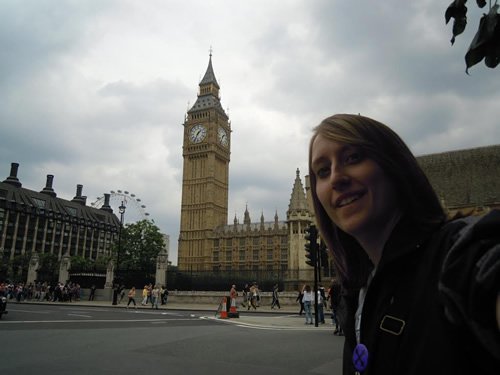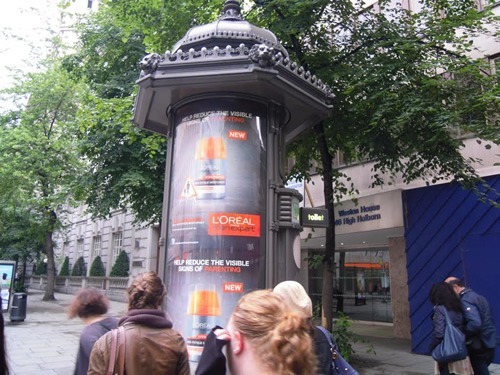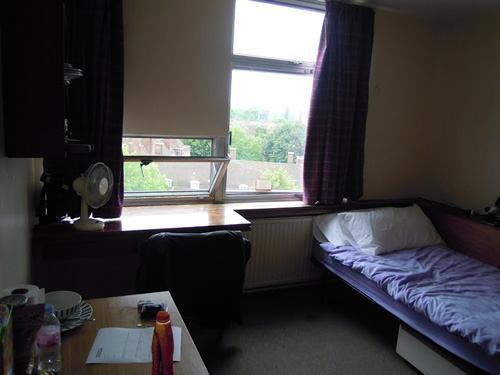Study Abroad in London: Planning and Living An Odyssey
Article and photos by Heather Robinette

|
|
During time off from study, Heather is in front of Big Ben in London. |
“Study abroad isn’t for me.”
Sound familiar? There were countless times in classes, meetings, and just around campus that I would hear other students say that studying abroad wasn’t for them. Before going abroad, I usually accepted their views and thought that, like most things in life, it isn't for everyone. But after returning from my study abroad experience in London, I would ask students why they held such a point of view. I discovered during my trip that anyone can study abroad. It is a great opportunity, and I believe that one of the biggest reasons most students don’t want to study overseas is related more to the degree to which they must leave their comfort zone. However, I believe that is precisely one of the reasons anyone with the opportunity should consider studying abroad. You challenge yourself in new surroundings and learn about another culture and yourself.
From Kansas to London — How I Landed Abroad
Between 12 and 18, I traveled to many states independently with various People to People programs. Yet, I had never been outside of the United States. During my first year at Kansas State University, I knew I wanted to study abroad due to my previous experiences on the road…not only due to the welcome prospect of travel but because of the people I had met in programs from all over the world. Once in college, I had the opportunity to speak with others who had studied overseas, and that’s when I knew I had to go abroad myself. I knew it would be a great opportunity to experience a new culture and see the world from a completely different point of view.
There were a couple of aspects I considered when making my decision regarding where to go. Aside from wanting to immerse myself deeply in another culture, my main interests included seeing historical sites and museums due to a love of history. I wanted to see history come alive and have the opportunity to see historical events from a different perspective. Since I hadn’t studied a second language, I started by narrowing my choices to English-speaking countries. I selected London, England, for three reasons: it’s an English-speaking country with a rich history. I could take a marketing class (my major) to provide a different take on marketing than in the US.
Other significant decisions students must consider include selecting a location, deciding how long to study abroad, and whether to go with a program or pursue direct attendance. I went to the University of Westminster during a summer term because it was a shorter time frame and best fit my particular needs. I went with Academic Programs International (API) as the program provider because they could assist me during the entire process and offered onsite support.
The summer term classes at the University of Westminster offered organized weekend activities, and the API program provider offered other activities during the week. The directors of API helped introduce us to London for the first couple of days and took us to school for orientation; afterward, we were free to choose our own activities or experiences. They would meet up with us for program-specific activities and were only a phone call away if we needed anything. While we were free to do whatever we wanted, the program directors provided a safety net if anything were to go wrong. Going with a program provider increased the cost of studying abroad. However, I knew I had resources that I could rely upon throughout the entire process. By going during the summer term instead of a semester, I could cover the cost, so everything worked out for me regarding the budget.
Selecting the Right Study Abroad Experience for You — One Size Doesn’t Fit All
-
Meet with a study abroad advisor (or academic advisor) and learn about the process. Use this opportunity to ask questions about what programs are partnered with the school and how previous students have studied or worked abroad.
Note: Start early so you have the largest number of opportunities available from which to choose.
-
Attend a study abroad fair. Fairs are a great opportunity to speak with representatives and get additional information about programs, locations, etc.
-
Research schools, programs, locations, classes, and costs. Use the information you’ve gathered and the internet to research different options. A significant factor for many people is the cost. Nonetheless, if you start early and do your research, you can find scholarships and other ways to meet your financial needs. Class credits are another factor, especially as students go further into their college careers because fewer classes transfer over into credits.
-
Talk with other students who have studied abroad. One of the best ways to get a better idea about studying abroad is to ask someone who has previously been abroad because their first-hand experience can help you better understand what it’s like and what to expect.
-
Make a priority list to help you narrow down your options. As you continue the process, you can start to narrow down your decision by making a list of your priorities, such as language requirements and program length.
-
Picture yourself studying abroad at each location.
When you have a few options, try picturing yourself traveling around and experiencing each country. Which one feels right?
-
Make a decision. Once you’ve decided, meet with your study abroad advisor and start the paperwork (application, enrollment, scholarships, etc.).
-
Continue to research. After completing your paperwork, continue to research and prepare until you leave.
|
Across the Pond — My Time in London
After arriving in London, I quickly learned that some things I take for granted in everyday life in the US would be very different during my time abroad, including something as simple as public restrooms! During our initial walking tour, I was told never to pass up a chance to use a toilet because you don’t know the next time you’ll see one — and also that public toilets can cost money. After a long bus ride for one of our trips, I got off the bus and dashed to a nearby toilet — only to find a payment booth between the bathroom and me. It’s an experience I’ll never forget.

|
|
Public toilet in London.
|
Shopping at home is also different. While living in London, I did my grocery shopping at the nearby Tesco or Sainsbury’s, which offered a limited selection of food compared to my home in the US, though I soon adapted. Luckily, I could find many similar foods that I was used to from back home. In the UK, there’s also a shop called Argos. You select the items you want from a catalog and wait for your order number to be called. It was a different concept, but it provided an invaluable chance to learn how to adapt to new circumstances outside of my comfort zone. Because of all the variations I experienced daily, I became more comfortable adapting to the surroundings and more open to embracing change.

|
|
Map of the underground tube in London.
|
During my time abroad, I took two business classes. The first class was called "Marketing in Everyday Life." One class event that I found interesting included visiting a London museum dedicated to branding, packaging, and advertising. We also had several hands-on assignments that required us to walk around central London and look out for different types of marketing in stores. The second class was called "Business Communications," and the best part of the course was the final project involving a presentation about our favorite part of London. At the beginning of the class, the professor explained how her regular courses are structured to give us an idea. However, the summer classes at the university are geared only toward study-abroad students. The university does not offer summer classes, so everyone in my classes was from different parts of the world, which made for an even more diverse study abroad experience.
Deciding on living arrangements was another critical aspect of my experience studying abroad in London. Some students lived with a host family, while others lived in a flat (similar to a dorm). I chose to live in a university flat in central London. All students were given their rooms, complete with a desk, bed, and closet. Each floor had a full kitchen and restroom, but the bath and toilet were in separate rooms — where a bathroom was a room with a bath, and the toilet was a room with a bathroom. I shared a flat with a diverse group of people from many countries, and it was an eye-opening experience to share the kitchen because each culture cooked and ate very different foods.

|
|
My room in a student housing flat in London.
|
Some of the highlights during my time abroad included visiting many museums (Museum of London, British Museum, and Churchill War Rooms), churches (Westminster Abbey and St. Paul’s), and walking tours (Harry Potter, James Bond, and Jack the Ripper), as well as traveling to places like Bath (Roman Baths), Oxford (Oxford University), and cities in Wales (castles and a coal mine museum). While there is a vast amount of things to see and do in London, there are even more activities outside the city that are well worth the trip.
During my time in London, I tried to assimilate into the culture but still acted with respect and with the understanding that when I started talking, most people knew I was from the United States. I tried to leave a good impression because Europeans often see Americans as loud and obnoxious. I consciously sought to help change people’s image and act as a brand ambassador for the United States.

|
|
One view of the London skyline.
|
Starting a New Chapter — Returning Home
About five months after returning from London, I could travel abroad again. I went on a faculty-led study-abroad tour to Argentina and Chile. I am pursuing my MBA and plan to study abroad as a graduate student. I recommend studying abroad, as each trip is a great opportunity and provides unique experiences.
Key selling points for studying abroad include the intercultural skills you develop while away from familiar surroundings. These skills have been instrumental in my career and are sought out by employers. You start to see the world through a different lens, and those skills are what employers are increasingly seeking. Employees with such experience abroad bring a different dynamic and can help a good team become great.
As a result of my time abroad, I have gained many valuable skills useful in my collegiate life and professional career. I pay more attention to world events, can better adapt to new situations, and feel better equipped when I work with international customers and partners. My ventures abroad helped me achieve the goal of having a better understanding of what it means to be a global citizen. After studying abroad, I have become more open-minded and have international experiences that can benefit my future career. In sum, the totality of my overseas experiences helped form me into who I am today, personally and professionally.
Staying Connected While Studying Abroad
Before studying abroad, I had never left the United States or been outside of Kansas for more than two weeks at a time. Studying abroad was a big change for me and my family. The best way to prepare your family is to ensure you have a realistic communication plan before leaving.
The first part of the plan should be determining the form of communication upon arrival. Your family will be anxious to hear from you as soon as you land, but let them know it could be several hours before you can contact them.
The first few days can be the toughest as you figure out communication tools, but you will develop a routine in time. My mom and I decided to communicate via Skype. Before I left, I ensured my mom was set up on Skype and knew how to make it work. We decided to chat at a regular time. I did have a cell phone, but it was reserved for emergencies due to the high cost of international calls. However, one advantage of cell phones is the ability to send text messages using Wi-Fi at no cost.
I kept a blog to keep everyone updated regarding my day-to-day activities. I also used social media while in London, as it was the primary communication method for the group since we only had access to cell phones. Establishing a balance in terms of time spent communicating before and at the beginning of the experience will help set expectations. Every family is different, but eventually, you’ll find what works best to stay in contact with your family.
Still Think Studying Abroad Isn't For You?
Studying abroad is a big decision, but I strongly encourage you to go. From my experience, it is the chance of a lifetime and a unique experience you’ll look back upon fondly. My favorite parts of studying abroad were experiencing a foreign culture and learning about local history. However, the one moment that stayed with me occurred when I was walking down the street after just a few weeks in London, and someone stopped me to ask for directions. I could point them to the correct path, which was a great feeling. At that moment, I no longer felt like a mere visitor but like a local living in the country who belonged.
|
For More Information with Study Abroad Program Providers in London
Academic Programs International (in which I participated)
API is an independent study abroad provider based in the United States that offers internships. Programs are currently offered in locations around the world. API arranges housing, educational logistics, and excursions for each program.
|
Heather Robinette was born and raised in Great Bend, Kansas, she recently relocated to Las Vegas from Texas with her husband, Chris. She studied marketing at Kansas State University and is working on her MBA through Emporia State University.
|
